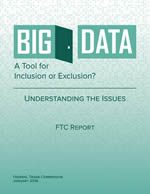 |
| The new report is posted at www.ftc.gov. |
The Federal Trade Commission has outlined a number of questions for businesses to consider in their use of big data analytics. “Big data’s role is growing in nearly every area of business, affecting millions of consumers in concrete ways,” says Chairwoman Edith Ramirez. “The potential benefits to consumers are significant, but businesses must ensure that their big data use does not lead to harmful exclusion or discrimination.”
“Big Data: A Tool for Inclusion or Exclusion? Understanding the Issues” looks specifically at big data at the end of its lifecycle—how it is used after being collected and analyzed, and draws on information from the FTC’s 2014 “Big Data: A Tool for Inclusion or Exclusion?” workshop, plus extensive public comments and additional public research. The report highlights a number of innovative uses of big data that are providing benefits to underserved populations, access to credit through non-traditional methods, along with possible risks that could result from biases or inaccuracies about certain groups, including more individuals mistakenly denied opportunities based on the actions of others; exposing sensitive information; creating or reinforcing existing disparities; assisting in the targeting of vulnerable consumers for fraud; creating higher prices for goods and services in lower-income communities; and, weakening the effectiveness of consumer choice.
The report outlines some of the various laws that apply to the use of big data, especially in regards to possible issues of discrimination or exclusion, including the Fair Credit Reporting Act, FTC Act and equal opportunity laws. It also provides a range of questions for businesses to consider when they examine whether their big data programs comply with these laws. Four key policy questions are drawn from research into the ways big data can both present and prevent harms. They are designed to help companies determine how best to maximize the benefit of their use of big data while limiting possible harms by examining both practical questions of accuracy and built-in bias, as well as whether the company’s use of big data raises ethical or fairness concerns.
Drug testing specialist settles agency charges
Drug Testing Compliance Group, LLC, which provides drug and alcohol testing and other services to commercial trucking companies and their drivers, agreed to settle Federal Trade Commission charges that it illegally invited one of its competitors to enter into a customer allocation agreement. According to an agency complaint, DTC Group President David Crossett informed the competitor that such an agreement would allow each company to sell its services to customers without fearing that its rival would later undercut it with a lower price offer. The proposed settlement prohibits DTC Group from a) communicating with competitors about rates or prices; b) soliciting, entering into, or maintaining an agreement with any competitor to divide markets, allocate customers, or fix prices; and, c) urging any competitor to raise, fix, or maintain prices, or to limit or reduce service. — January 2016 Federal Trade Commission International Monthly
Fuel Tax Credits, CNG power progress
Assessing recent actions on Capitol Hill, Newport Beach, Calif.-based Clean Energy Fuels Corp. applauds passage of an alternative fuel tax credit supporting the use of compressed natural gas (CNG) or liquefied natural gas (LNG) in commercial trucking. The credit is retroactive to 2015 and extends through 2016.
“The tax credit will support the continued expansion of natural gas fueling in the U.S., which will help to clean our air and keep dollars here,” says Clean Energy CEO Andrew Littlefair. “We applaud Congress for taking this action and encourage the implementation of permanent measures to encourage further use of this superior and cleaner fuel.” The tax credit capped a successful 2015, he adds, as Clean Energy logged 68 CNG or LNG fueling station projects and saw 3,000-plus vehicles join its fueling network—despite sharp drops in diesel prices.
Diesel price conditions are not lost on waste and refuse hauling, the heavy duty trucking segment with the highest adoption of CNG power. Notes Solid Waste Association of North America Executive Director David Biderman, “One of the remarkable things that occurred [in 2015] is that despite the declining price of diesel, the purchase of natural gas fueled waste collection vehicles has remained steady as companies and local governments seek to reduce carbon footprint, emissions and costs.”
